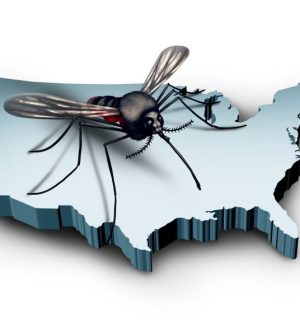- The Long-Term Effects of Daily Turmeric Supplements on Liver Health
- Could Your Grocery Store Meat Be Causing Recurring UTIs?
- Are You Making This Expensive Thermostat Error This Winter?
- Recognizing the Signs of Hypothyroidism
- 10 Strategies to Overcome Insomnia
- Could Artificial Sweeteners Be Aging the Brain Faster?
- Techniques for Soothing Your Nervous System
- Does the Water in Your House Smell Funny? Here’s Why
- Can a Daily Dose of Apple Cider Vinegar Actually Aid Weight Loss?
- 6 Health Beverages That Can Actually Spike Your Blood Sugar
It’s Mosquito Season: Here’s How to Protect Yourself

Summer is synonymous with mosquitoes, and that means possible exposure to the West Nile and Zika viruses. Both are spread mainly through mosquito bites.
Most people won’t experience symptoms from either virus, but there are important differences to be aware of.
West Nile
- Up to 20% of infected people have symptoms, such as a fever, headache, body aches, joint pain, vomiting, diarrhea and/or rash.
- About one in 150 develop a serious inflammation of the brain or surrounding tissues with headache, high fever, neck stiffness, disorientation, coma, tremors, seizures or paralysis.
- People over 60 and those with certain chronic medical conditions are at the greatest risk for serious illness.
Zika Virus
- Eighty percent of those infected get mild or no noticeable symptoms.
- Possible symptoms vary and might include fever, rash, joint or muscle pain, conjunctivitis and/or headache.
- Symptoms can start up to seven days after exposure and last up to seven days.
- A pregnant mother can pass it to her baby. If you’re pregnant and suspect Zika, see your doctor immediately for testing.
- Zika also can be spread from men to their partners through sex, and it’s linked to brain-related birth defects and miscarriages. The U.S. Centers for Disease Control and Prevention recommends that pregnant women not travel to areas where there is a Zika outbreak. If you must travel to a risky area, prevention is essential.
How to Protect Yourself
These steps will help you avoid both diseases:
- Make sure all window and door screens in your home are free of holes that could let in mosquitoes.
- Wear long-sleeved shirts and long pants when outdoors, and use a U.S. Environmental Protection Agency-registered insect repellent with an active ingredient such as DEET or oil of lemon eucalyptus, on exposed skin. Used as directed, these repellents are safe and effective, even for pregnant and breastfeeding women.
- Always follow label instructions — some, such as those with permethrin, should be applied to clothing, not to skin, and some aren’t safe for children under age 3.
- To protect a child, spray the repellent on your hands and then apply, avoiding the child’s hands, eyes, mouth and any cuts or irritated skin.
- When using sunscreen, apply it before the repellent.
- Consider covering baby’s stroller with mosquito netting when outdoors.
To limit mosquito breeding, get rid of any outdoor items that can collect water, from Fido’s bowl to gardening buckets to old cans and tires. Empty the kiddie pool between uses. Tightly cover any rain barrels, and regularly unclog gutters and runoff drains.
More information
The CDC has more on West Nile and Zika online.
Source: HealthDay
Copyright © 2026 HealthDay. All rights reserved.










